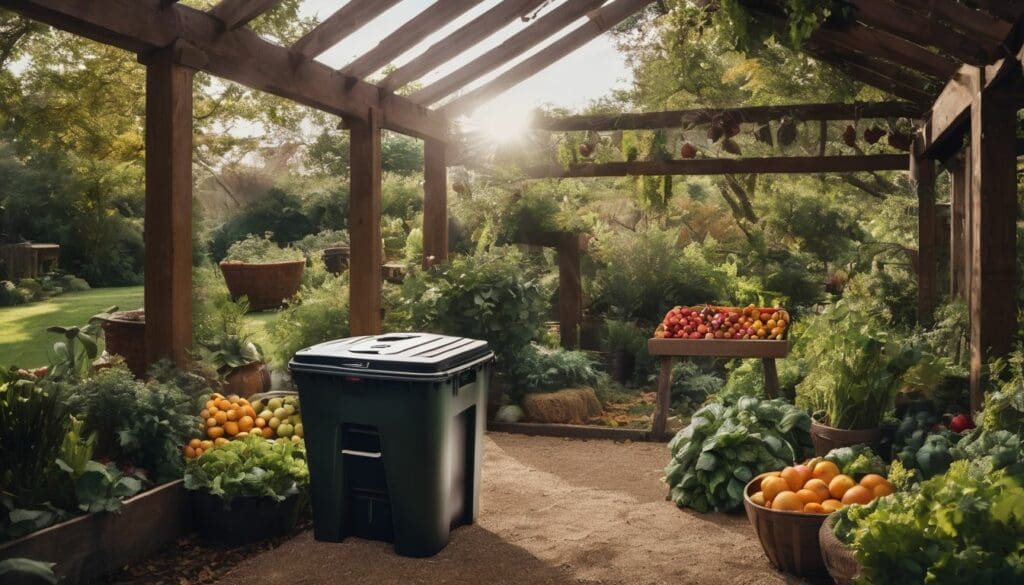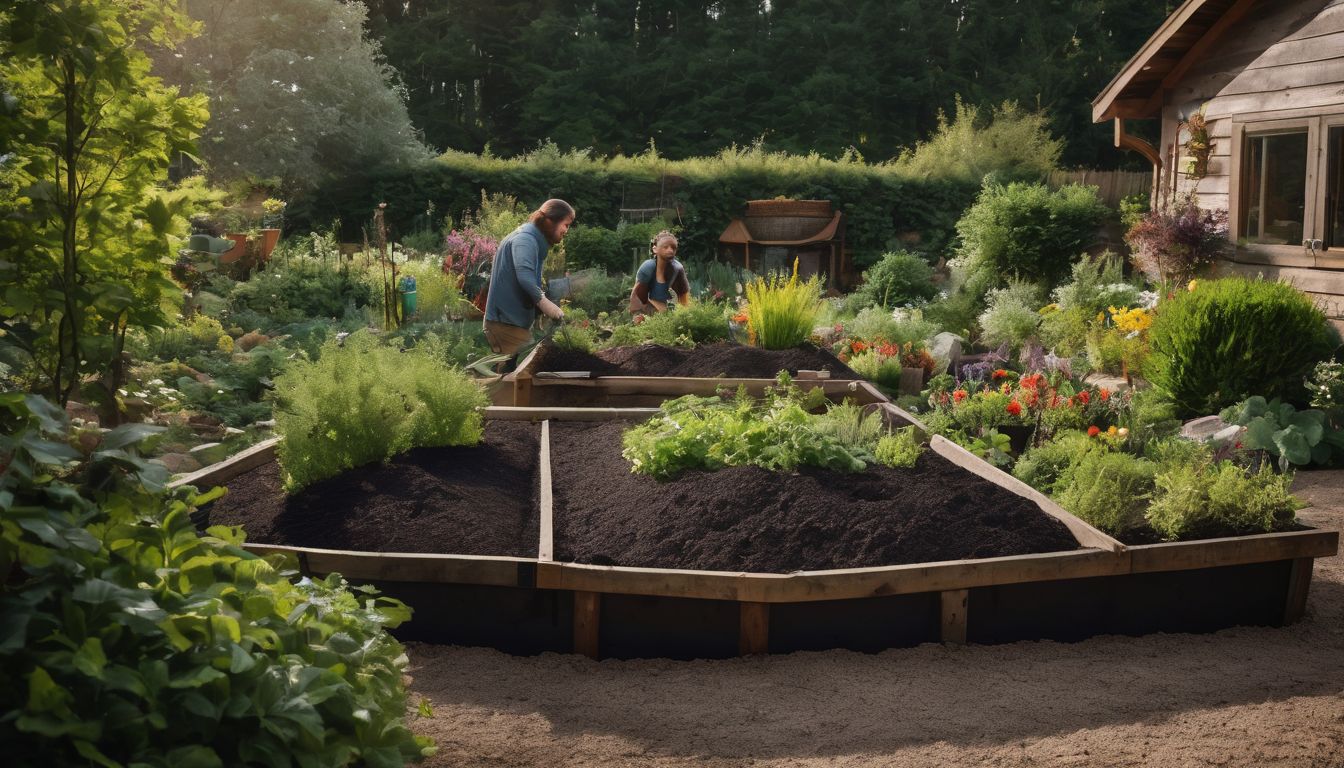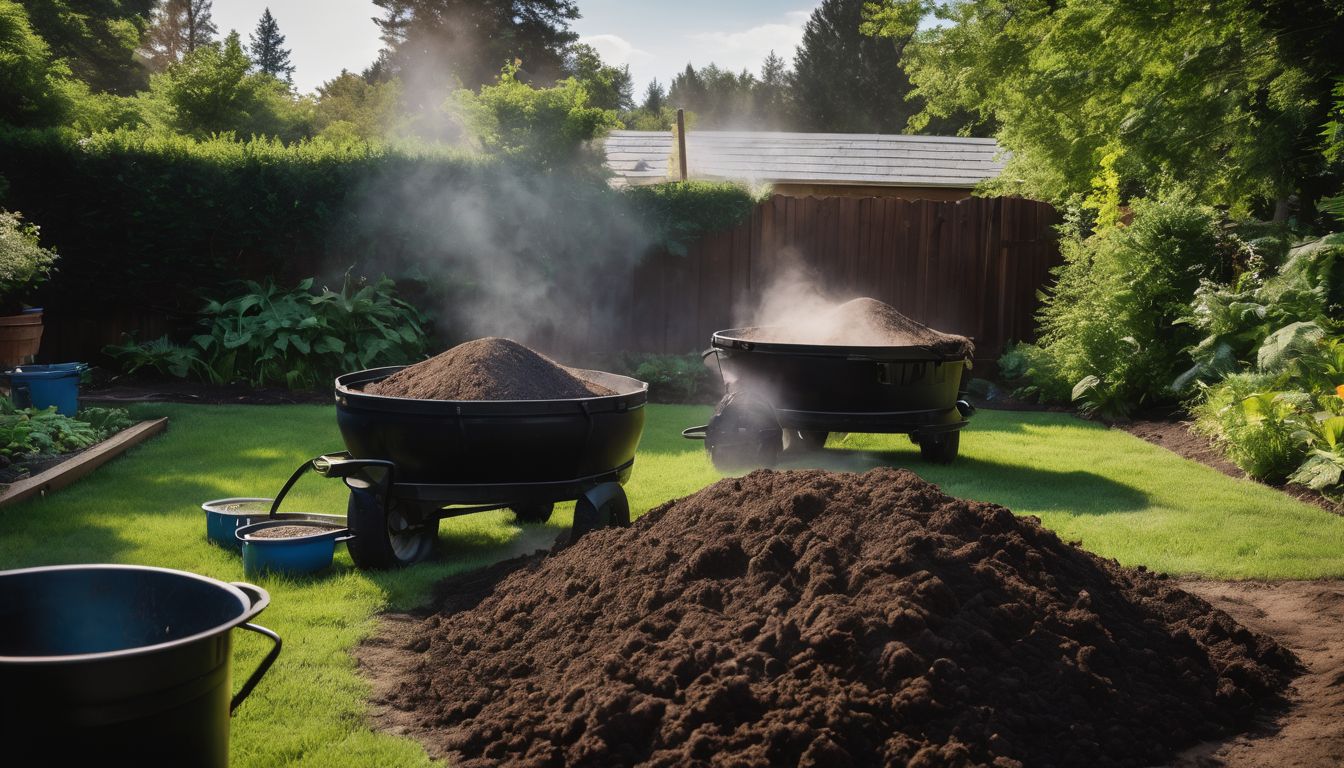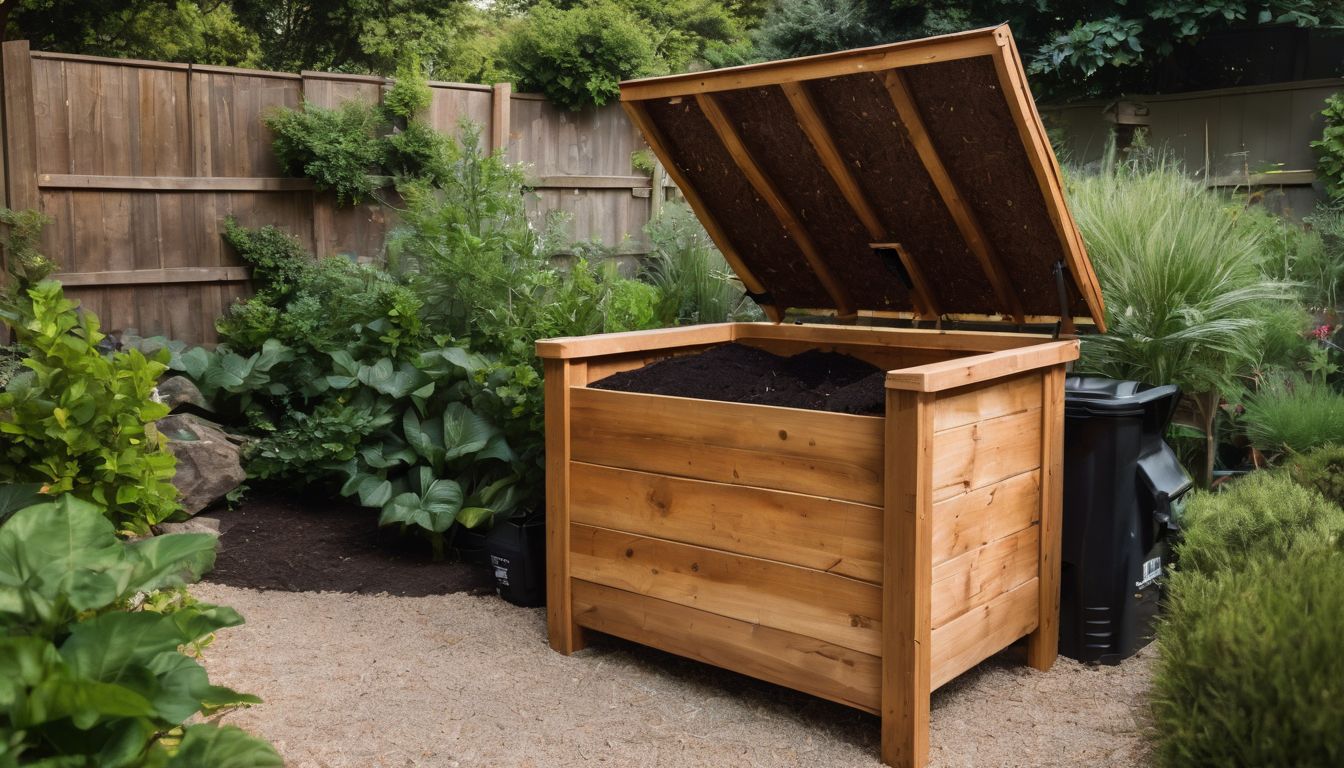Feeling overwhelmed with your kitchen scraps and garden waste? Home composting transforms leftovers into rich soil, helping the planet and gardens thrive. This article is a guide to turning organic waste into treasure without common pitfalls.
Dive in for greener choices!
Key Takeaways
- Position your compost heap on bare soil to encourage natural processes from worms and microbes, which help break down waste efficiently.
- Regularly turning your compost improves oxygen circulation and speeds up decomposition while reducing unwanted smells.
- Avoid adding meat, dairy, fish, bones or pesticide – treated yard waste as these can attract pests and slow the process or introduce harmful substances to the compost.
- Keep your compost bin a good distance from your home to avoid attracting rodents or experiencing any unpleasant odours in living areas.
- Save money and benefit the environment by using kitchen scraps and garden waste to create homemade fertiliser instead of buying chemical alternatives.
The Benefits of Home Composting
Composting at home offers numerous benefits, including reducing food waste, improving soil health, and saving money on fertilisers. It’s an eco-friendly way to manage organic waste and contribute to a healthier environment.
Reducing food waste
Every year, homes toss out tonnes of food that could nourish gardens instead of filling landfills. By composting your kitchen leftovers, you’re turning potential waste into rich soil-enhancing material.
Peelings, tea bags, coffee grounds and spoiled vegetables become valuable resources. Composting at home isn’t just about being eco-friendly; it’s a practical step in sustainable waste management.
Manage your organic waste by setting up a simple compost pile or bin in the backyard. This natural recycling process transforms green and brown materials from your kitchen into potent fertiliser for plants.
Your small actions contribute significantly to environmental sustainability as each household reduces its carbon footprint through decreased methane emissions from rotting food in dumps.
Improving soil health
To improve soil health, incorporate composting into your gardening routine. Composting provides a rich source of organic matter, which enhances the soil’s structure and fertility. This process also encourages beneficial microorganisms that support plant growth and resilience.
By using compost as a natural fertiliser, you can reduce reliance on chemical alternatives, promoting sustainable and environmentally friendly gardening practices. Moreover, embracing composting helps to enrich the soil with essential nutrients, fostering healthier and more vibrant plants while upholding green waste reduction strategies.
With proper understanding of home composting solutions and techniques for managing organic waste efficiently, individuals can contribute to reducing food waste, supporting environmental conservation by minimising the need for synthetic fertilisers.
Saving money on fertilisers
By composting at home, you can save money on fertilisers. Organic waste from your kitchen and garden can be turned into nutrient-rich compost, reducing the need to purchase chemical fertilisers.
This natural alternative enriches the soil with essential nutrients, promoting healthier plant growth and saving you money in the long run.
Instead of spending on commercial fertilisers, consider using the biodegradable materials from your household waste to create a sustainable source of nutrients for your garden or yard.
Dos of Home Composting
– Start your compost pile on bare earth to allow for proper drainage and access to soil organisms.
– Promote proper air circulation by turning the compost regularly and using a diverse mix of materials, including green and brown waste.
Start on bare earth
Begin composting directly on the ground to allow for natural drainage and access by beneficial organisms in the soil. Placing compost bins or piles on bare earth supports decomposition by enabling worms and other microbes to enter from below, aiding in breaking down organic matter efficiently.
This method helps maintain a healthy balance of moisture and ensures easy integration of nutrients into the surrounding soil, promoting an eco-friendly waste disposal approach that enriches your garden.
Ensure proper air circulation through the bottom of your compost pile or bin by starting directly on bare earth. Incorporating green and brown materials for composting onto open ground encourages aeration while facilitating a smooth flow of oxygen essential for successful decomposition processes.
Promote proper air circulation
To promote proper air circulation in your compost pile, regularly turn and mix the materials. This aerates the pile, preventing it from becoming compacted and allowing oxygen to reach the microorganisms responsible for breaking down organic matter.
Additionally, consider using a pitchfork or compost turning tool to ensure an even distribution of air throughout the pile.
By promoting proper air circulation within your compost pile, you create an ideal environment for decomposition to occur efficiently while reducing the chances of unpleasant odors developing.
Furthermore, this practice helps maintain a healthy balance of carbon and nitrogen within the pile, leading to nutrient-rich compost that can be used to enrich soil in your garden.
Build near a water source
Position your compost pile near a water source to ensure a consistent moisture level. This helps to sustain the decomposition process and prevents the pile from becoming too dry. Regularly watering the compost also fosters microbial activity, aiding in breaking down organic matter into nutrient-rich soil.
Maintaining proper moisture levels is crucial for successful composting. By situating your compost pile near a water source, you can easily regulate its hydration, promoting an efficient and effective decomposition process which leads to high-quality compost for enriching your garden soil.
Use a diverse mix of materials
To achieve a balanced compost, combine green materials like fruit and vegetable scraps with brown materials such as leaves, straw, and cardboard. This diverse mix provides the right ratio of carbon to nitrogen for efficient decomposition.
It’s important to chop or shred larger materials to speed up the composting process; this improves airflow and helps break down the organic matter more effectively.
Incorporating different types of waste not only enriches the nutrient content of your compost but also prevents unpleasant odours and encourages microbial diversity. Including a variety of organic matter from your kitchen and yard will result in richer, healthier soil for your garden while reducing landfill waste.
Cut food scraps into smaller pieces
Before adding food scraps to your compost pile, remember to cut them into smaller pieces. This promotes faster decomposition and helps maintain a balanced mix of materials in the compost.
Smaller food scraps break down more efficiently, creating better airflow throughout the pile and preventing clumping or compacting. By cutting food scraps into smaller pieces, you increase their surface area and make it easier for microorganisms to break them down, accelerating the composting process.
Ensure that every piece is small enough to decompose evenly by using a sharp knife or kitchen shears. Smaller food scraps also discourage pests and rodents from being attracted to your compost bin while assisting in producing nutrient-rich soil for your garden.
Don’ts of Home Composting
– Keep the compost bin uncovered, as this can attract pests and slow down the decomposition process.
– Add certain food scraps like fish, dairy, or bones, as these can attract unwanted animals and create unpleasant odors.
Leave the compost bin uncovered
Leaving the compost bin uncovered invites pests and animals to scavenge through the pile, disrupting the composting process. Exposure to rain can also lead to excess moisture, which may cause unpleasant odors and slow down decomposition.
The best practice is to cover the compost bin with a lid or breathable material, which helps regulate moisture levels while keeping unwanted visitors out.
By leaving the compost bin open, you risk creating an unbalanced environment that hinders efficient decomposition and attracts pests. Covering it ensures a more controlled process, leading to better-quality compost for your garden or plants without any unnecessary hassle or issues.
Add certain food scraps (fish, dairy, bones)
Avoid adding certain food scraps like fish, dairy, and bones to your compost pile. These items can attract pests and create unpleasant odours as they decompose. Additionally, these materials take longer to break down and may introduce harmful bacteria into your compost, affecting its quality as a natural fertiliser for your garden.
Consider using vegetable and fruit scraps, coffee grounds, eggshells, and yard trimmings instead. These materials break down more easily and contribute valuable nutrients to your compost.
When done correctly, composting is an effective way to recycle organic waste while enriching the soil in an environmentally friendly manner.
Compost certain yard wastes (weedy plants, pesticides)
After avoiding adding certain food scraps like fish, dairy, and bones to the compost pile, it’s important to also be mindful of what yard wastes are suitable for composting. Avoid adding weedy plants or any materials treated with pesticides into your compost bin.
These can have a negative impact on the biological processes that should occur within your compost pile and may hinder the effectiveness of the final product as a natural fertiliser.
Be cautious when selecting which yard waste materials to include in your compost. Weeds and pesticide-treated vegetation can introduce unwanted chemicals or seeds into the mix, potentially causing issues down the line with unwanted plant growth or harming beneficial organisms in the soil if used as fertiliser.
Let the compost get too wet or dry
To avoid issues, keep the compost moist but not waterlogged. If it’s too dry, sprinkle it with water. Don’t let it become a soggy mess; this prevents proper decomposition. Aerate the pile to maintain moisture levels and promote healthy microbial activity.
Be sure to monitor your compost regularly for signs of excessive dryness or moisture. Adjust as needed by adding more browns if it’s too wet or sprinkling with water if it’s too dry.
This will help ensure that your composting process remains efficient and effective while avoiding any potential problems associated with overly wet or dry conditions in the pile.
Keep the bin too close to the home
Position the compost bin away from your home to prevent any potential odours or pests from becoming a nuisance. Placing it closer than 10 feet can attract unwanted critters and cause unpleasant smells, so ensure you choose an appropriate location for the health of your surrounding environment.
Moving on to “Add the wrong materials”..
Add the wrong materials
Avoid adding meat, fish, dairy products, and bones to your compost pile. Also, refrain from including yard waste treated with pesticides or weed seeds that can infest your garden. Don’t let the compost become too wet or dry as this can impede decomposition.
Keep food scraps in smaller pieces and maintain a balance of green (nitrogen-rich) and brown (carbon-rich) materials in your compost to obtain optimal results.
Be cautious not to place items like plastic, glass, metal, or synthetic materials into the compost bin as they won’t decompose and may contaminate the soil. Remember not to position the bin too close to your home due to potential odours and pests.
Troubleshooting Common Issues
Managing moisture, proper aeration, access to the earth, controlling compost pile size, and knowing what to add and what not to add are all important factors in troubleshooting common composting issues.
For more detailed insights on how to troubleshoot common problems with home composting, keep reading!
Managing moisture
To manage moisture in your compost pile effectively, regularly check the dampness level. Adjust by adding more dry materials if it’s too wet or sprinkling with water if it’s too dry.
Turning the pile often helps distribute moisture evenly and encourages aeration, preventing anaerobic conditions that lead to unpleasant odours. Covering the pile during heavy rain can prevent excessive water accumulation, helping maintain an optimal balance of moisture.
A well-maintained compost pile prevents issues like foul smells and slows down decomposition caused by excessively wet or dry conditions. Regular monitoring ensures an ideal environment for beneficial microorganisms to thrive and accelerate the composting process without producing harmful greenhouse gases.
Proper aeration
To ensure successful composting, proper aeration is essential. This means turning or mixing the compost regularly to introduce oxygen, which is necessary for the breakdown of organic matter.
A well-aerated compost pile prevents unpleasant odours and encourages the growth of beneficial microorganisms that facilitate decomposition. It’s important to maintain an optimal balance between air and moisture within the pile to create prime conditions for effective composting.
To keep your compost aerated, turn it with a pitchfork or shovel every few weeks. This simple act helps break up any compacted areas and introduces fresh air into the mix, promoting healthy decomposition.
Access to the earth
To ensure effective decomposition, place the compost pile directly on bare earth. This allows for beneficial organisms to access the organic matter and aids in proper drainage and aeration of the compost.
The soil below also provides natural insulation, helping to regulate temperature fluctuations within the compost pile. Additionally, direct contact with the earth encourages the exchange of nutrients between the compost and surrounding soil, enhancing its overall quality.
If constructing a raised bin or using a structure to contain your compost, consider leaving an open base to facilitate this vital connection with the earth below. This ensures that microorganisms such as bacteria and fungi can easily access your compost materials while fostering a healthy ecosystem within it.
Controlling compost pile size
To ensure efficient composting, controlling the size of your compost pile is crucial. A large pile can become too hot and kill beneficial microorganisms, while a small one might not generate enough heat for effective decomposition.
Aim for a pile that’s at least 3 feet high and wide to maintain optimum internal temperature. Turning the pile regularly helps distribute heat and oxygen, ensuring the composting process happens evenly throughout.
Balancing green (nitrogen-rich) and brown (carbon-rich) materials in your compost is essential to managing its size effectively. Green materials such as kitchen scraps, grass clippings, or plant cuttings provide nitrogen for the microorganisms that break down the waste.
Knowing what to add and what not to add
To ensure successful home composting, it is essential to add a diverse mix of materials such as fruit and vegetable scraps, coffee grounds, eggshells, yard trimmings, and shredded paper.
These items provide the necessary carbon and nitrogen balance for effective decomposition. However, it’s important not to add certain food scraps like meat, dairy products, fish, and bones as these can attract pests and produce unpleasant odours.
Additionally, avoid adding weedy plants treated with pesticides or any non-biodegradable materials that won’t break down in the compost pile.
When checking what to add or not to add to your compost bin, remember that maintaining proper air circulation by turning the pile regularly will help speed up the decomposition process while keeping away foul smells.
Conclusion
In conclusion, home composting offers numerous benefits for the environment and your garden. Remember to follow the dos of composting by starting on bare earth, promoting proper air circulation, and using a diverse mix of materials.
Conversely, ensure you avoid common mistakes such as leaving the compost bin uncovered, adding certain food scraps or yard wastes, and keeping the bin too close to your home. By following these tips and best practices, you can create nutrient-rich compost while minimising environmental impact.
FAQs
1. What should I always do when maintaining my compost heap?
You must regularly turn your compost heap and ensure it stays moist to help it break down properly, following proper composting practices for maintenance.
2. Can all food scraps go into the compost bin?
No, not all food scraps are suitable for composting; avoid adding meats or dairy products to prevent odours and pests.
3. How can I fix common mistakes in home composting?
Use troubleshooting techniques like adjusting moisture levels and mixing green and brown materials to address issues in your compost heap.
4. Why is it important to follow guidelines in home composting?
Following the dos and don’ts of home composting ensures that you create natural fertiliser effectively while practising ecofriendly waste disposal.
5. What benefits come from using good practices in home composter setups?
By adopting best practices for home composting tips, you enrich the soil naturally which supports green gardening efforts and helps our environment.





